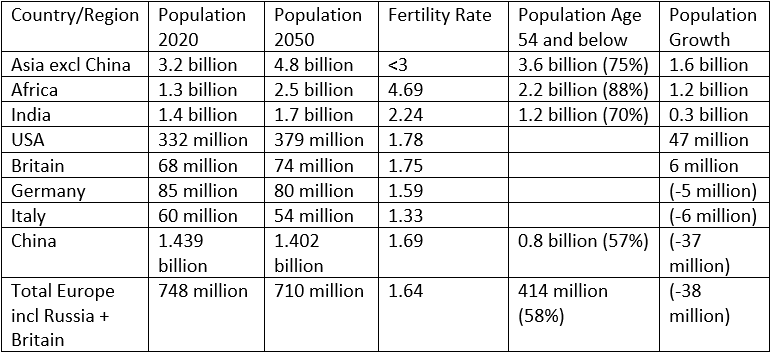The whole world is struggling with the Covid-19 pandemic, the horrors of the consequences of climate change not to mention the disaster that has currently befallen Afghanistan. This article focusses on our near-term future.

Source: All population figures taken from Worldometer
As can be seen from this chart, almost all of the world's projected population growth will come from Asia (not including China) and Africa. Population changes in the rest of the world pale into insignificance compared to this growth.
Advertisement
Historically, the all-powerful British Empirewas able to dominate the world with a relatively large cohesive population, and the fact that the Industrial Revolution started in Britain. No other country in Europe was able to match this. Italy and Germany only unified in 1871. The United States gained its independence from Britain in 1776, and its population then at 2.5 million grew exponentially year after year, mainly due to migration (including slavery) and the massive increase in immigration from Europe. As the poem by Emma Lazarus on the Statue of Liberty states: "Give me your tired, your poor, / Your huddled masses yearning to breathe free." As with Britain over the years, there were also massive technological advances in the United States. The basis of the democratic free world's growth was thus long-term sustainable population growth, coupled with technological improvements.
As can be seen from the above figures, even taking an optimistic view, this democratic dominance is now at risk.
Since World War II, the United Nations, particularly the USA, has been committed to the security of the democratic world. Readers might recall that the two defeated protagonists of World War II, i.e. Germany and Japan, were converted to democracies by the victorious Allies and this has been sustained. There are still large numbers of American troops both in Japan and Germany, and they are welcome there. Added to this situation, there has been ongoing technological innovation throughout the Western-orientated democratic world, led by the USA.
The big question now is: are the American people willing to maintain the security blanket that they have helped provide democracy for the past seventy years? There are indications that their commitment to this security blanket is weakening: Obama's lack of action on the 'red line' he declared in Syria in 2012, followed up by Trump's 'America first' policy, is an indication that this commitment is less than secure. The current fiasco in Afghanistan just adds to this uncertainty.
What will happen to the 'Democratic West' if the United States is no longer prepared to act as the world's policeman? What will happen if American troops are withdrawn from Germany and Japan, for example? What is the future of NATO?
Maybe it's time the rest of the democratic world looked after itself? In a recent book published in 2018, 'The Jungle Grows Back', Robert Kagan argues that the natural state of human affairs is for each tribe/community/race to individually look after themselves, and that what the United States has done in the past seventy years, is quite extraordinary in historical terms and. Thus if their security blanket is withdrawn, the world would revert to the chaos that prevailed earlier and resulted in the twentieth century's two world wars. This might well suit Russia and China.
Advertisement
It seems that the 'Democratic West' has some choices to make.
There is going to be enormous pressure from Africa and Asia for people to move to the 'Democratic West', partly as a result of the poor economic outlook in many of the countries in those two continents, but more importantly because of the projected unprecedented population growth.
What will the 'Democratic West' do?
Discuss in our Forums
See what other readers are saying about this article!
Click here to read & post comments.
7 posts so far.